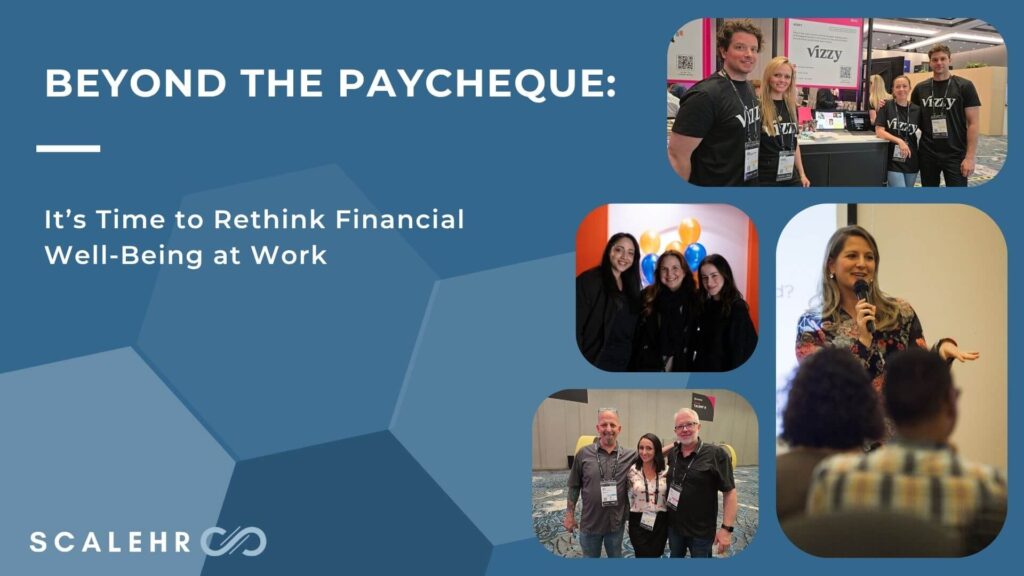In the comprehensive pursuit of employee well-being, many organizations rally around the physical, social, career, and community aspects. Yet, there’s one critical element that often gets overlooked, historically ignored, or poorly addressed: financial well-being. And right now, it’s arguably the element employees are struggling with the most, with profound implications for every other facet of their lives and work performance.
The Gallup model of employee well-being clearly identifies financial stability as one of its five core elements. While organizations may readily invest in ergonomic workspaces or team-building events, supporting employees’ financial lives has often been viewed as outside the corporate purview or simply equated to salary. This oversight is no longer sustainable. Poor financial well-being doesn’t exist in a vacuum; it has a direct, detrimental impact on concentration, stress levels, mental health, and overall productivity.
Note: this blog post follows up on a recent Unmuted Podcast episode with Antonio Zivanovic, Founder at Elektrafi. View the episode below.
A Workplace Emergency, Not a “Nice-to-Have”
For countries like Canada, this isn’t just a challenge, it’s a workplace emergency. We’re grappling with a housing affordability crisis, record-high private debt levels (Canada leads the world in this metric), and persistent inflation, rising costs of living, and declining purchasing power that continues to chip away at everyday stability. In this environment, financial well-being is no longer a perk; it’s a fundamental necessity. Employees are showing up to work under immense financial strain, and employers are beginning to see the direct consequences.
So, what does this heightened state of financial vulnerability look like in the workplace? It manifests as increased stress, presenteeism (being physically present but mentally distracted by financial worries), higher absenteeism due to stress-related illness, and a diminished capacity for engagement and innovation. The current moment is distinct because the compounding pressures of the economy have pushed many employees to their financial limits, making the need for employer intervention more urgent than ever before.
Defining “Effectively Managing Your Economic Life” in 2025
Gallup defines financial well-being as “effectively managing your economic life”. In 2025, this means far more than just having a bank account or making ends meet. It encompasses:
- Financial Literacy: Understanding core concepts like budgeting, debt management, saving, and investing.
- Resilience: The ability to withstand unexpected financial shocks (e.g. job loss, medical emergency) without falling into crisis.
- Future Planning: Having a clear vision and actionable steps for long-term goals like retirement, homeownership, or education.
- Control & Confidence: Feeling a sense of agency over one’s money, rather than feeling overwhelmed or trapped.
Many Canadians are significantly far from this reality. They are grappling with complex financial products, conflicting advice, and the sheer mental load of trying to stay afloat in a challenging economic climate.
Beyond the Paycheck: Modern Financial Wellness Programs
If financial well-being isn’t just about salary, and a single “lunch and learn” on budgeting isn’t enough, what do truly effective, modern financial wellness programs look like?
They are holistic, personalized, and proactive. They move beyond passive education to provide actionable support and tools. This includes:
- Personalized Financial Guidance: Offering access to qualified financial advisors or AI-powered platforms that provide tailored insights, rather than generic advice.
- Tools for Understanding: Leveraging technology to help employees visualize their entire financial picture, track spending, identify savings opportunities, and manage debt.
- Comprehensive Education: Moving beyond basic budgeting to include topics like navigating mortgages, understanding benefits, saving for retirement, and managing investments, delivered in accessible and engaging formats.
- Integration with Benefits: Helping employees understand and maximize the value of their existing benefits package, including retirement plans, health spending accounts, and employee assistance programs.
- Addressing Specific Needs: Recognizing that different employee demographics (e.g., new graduates, parents, pre-retirees) have unique financial challenges and offering targeted support.
One Cost-Effective Step You Can Take Tomorrow
For HR and business leaders looking to make a meaningful difference immediately, there’s a powerful and cost-effective starting point: transparently explain and help employees truly understand their total compensation package.
It sounds simple, but many employees only focus on their base salary. By clearly breaking down the value of benefits like health insurance, retirement contributions, stock options, paid time off, and any other perks, you’re not just communicating value; you’re providing vital financial literacy. Help them see how these components contribute to their overall financial security and future. This act alone can shift perspective, increase appreciation, and lay a foundation for more sophisticated financial planning.
Investing in financial well-being is no longer optional. It’s a strategic imperative that builds a more resilient, engaged, and productive workforce, proving that supporting employees beyond the paycheque yields significant returns for everyone.








